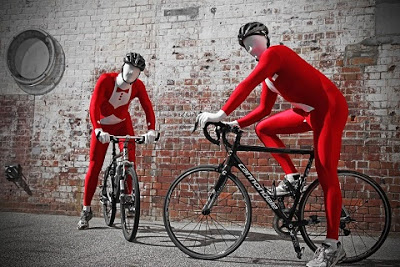Q: How do you devote countless hours to a solitary pursuit that only benefits you without becoming an flaming egomaniac?
A: You don’t. You just learn how to hide it.
Triathletes are narcissistic, elitist and self-entitled. Ask anyone. They corner unsuspecting family members, friends and even random passersby and regale them with their latest training and racing exploits, diet critiques and training advice. Asking a triathlete what they did on the weekend is an open invitation for an interminable, self-aggrandizing monologue. After all, triathletes train for three sports, have the most badass events and live by the doctrine of HTFU. How could it not go to their heads?
In my experience, most triathletes don’t fit this stereotype. But I conjecture that many of the type-As drawn to triathlon harbour these negative traits; the reasonable ones just learn to suppress them. Let down your guard and latent narcissism will rear its ugly head. For example, yesterday at the pool there were a few slow pokes occupying the fast lane. My initial reaction was righteous indignation. Make way! Pseudo-pro triathlete on deck. Being an arrogant jerk won’t get you far in life. The least you can do is present a socially acceptable facade. For starters, I present:
A Triathlete’s Guide to Functional Narcissism
- Don’t dominate conversations. Miraculously, other people have lives outside of triathlon. Ask about them. Smile, nod and resist the urge to interject your race report.
- Avoid gratuitous displays of fitness. You will alienate yourself and intimidate the unfit masses. Push-up and sit-up competitions are not appropriate party activities. Consider using your car keys as a prop to hide the fact that you cycled/ran to work.
- Dress like a normal person. Reserve technical clothing—especially race shirts—for workouts and loungewear. Sadly, your ’99 Turkey Trot 10k Winner t-shirt won’t impress anyone. And if you can’t resist wearing spandex around town, be prepared to foil villains, rescue kittens and perform other superhero duties.
- Be flexible with food. Don’t force people to cater to your arcane dietary restrictions. Pretend to enjoy their food, then a) politely excuse yourself and induce vomiting, or b) double your training the next day. Refrain from extolling your paleo/gluten-free/raw food diet. Content yourself with the fact that you will outperform and outlive them.
- Avoid admiring your reflection in windows. Everyone in the restaurant noticed your impeccable form the first time you ran past. The fourth time was excessive.
- Diversify your Facebook and Twitter posts. Intersperse triathlon-related content with miscellaneous links that make you appear compassionate and cultured. For material, try googling “child poverty”, “postmodern sculpture” or “Obama conspiracies”.
- Don’t flex whenever someone touches you. The nurse just wants to give you a needle, not fondle your iron biceps.
- Register for a charity fundraising race. This is a surefire way to convince people that you’re altruistic and stuff. But it’s actually a clever ruse—most races waive the entry fee if you raise enough money.
- Don’t dispense unsolicited exercise advice. The hobby-jogger across the street probably won’t grasp your dissertation on midfoot striking and minimalist shoes. Besides, they should be paying for your expertise.
- Hide your addiction. Don’t let other people see how much time, money and energy you spend training, gear shopping, perusing Slowtwitch, creeping race results and reading frivolous triathlon blogs. Shred your credit card bills, burn your gel wrappers and guard your training log. You could even workout in disguise…








